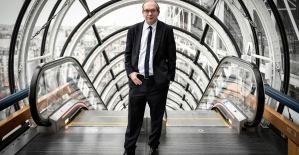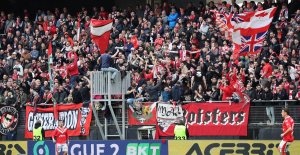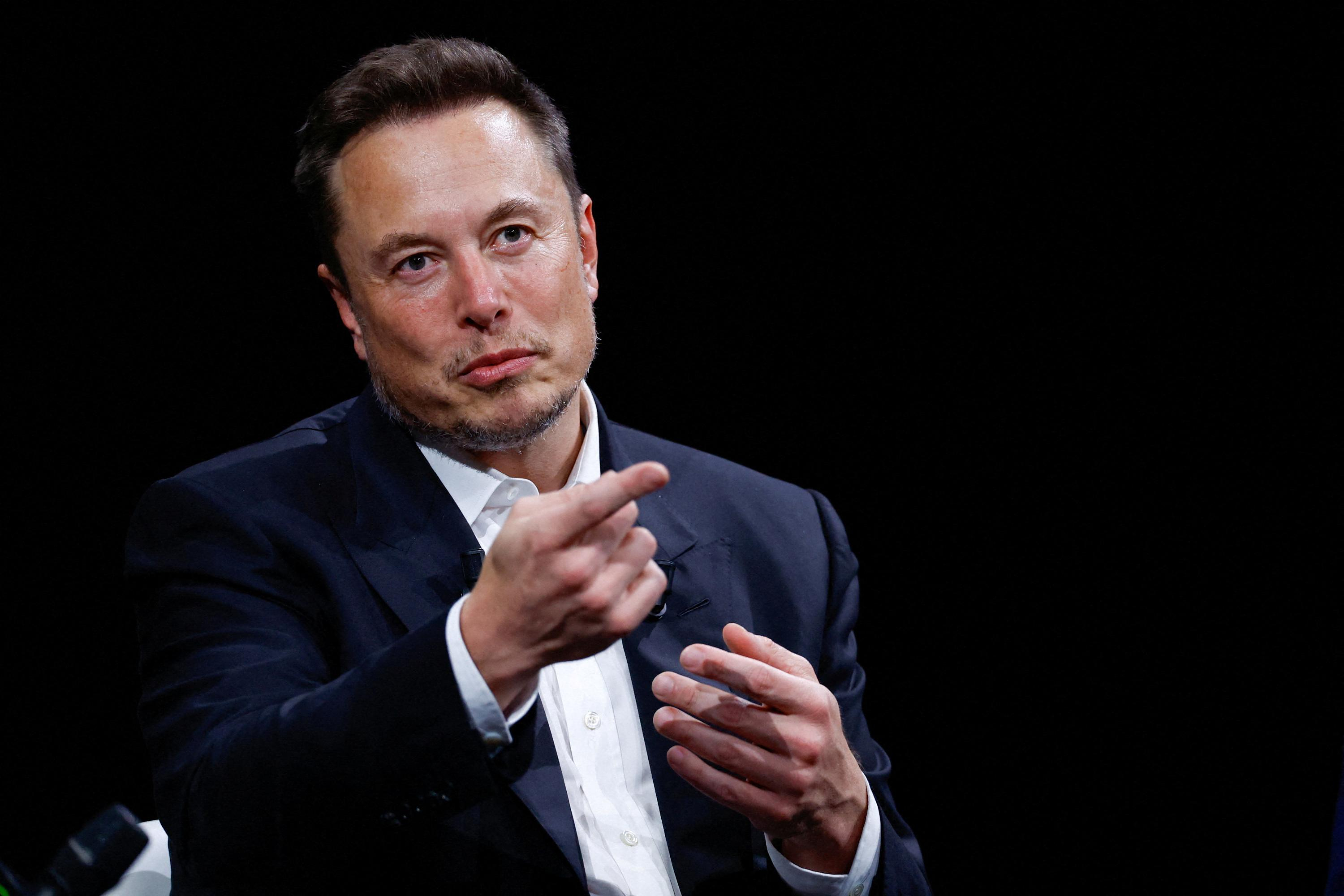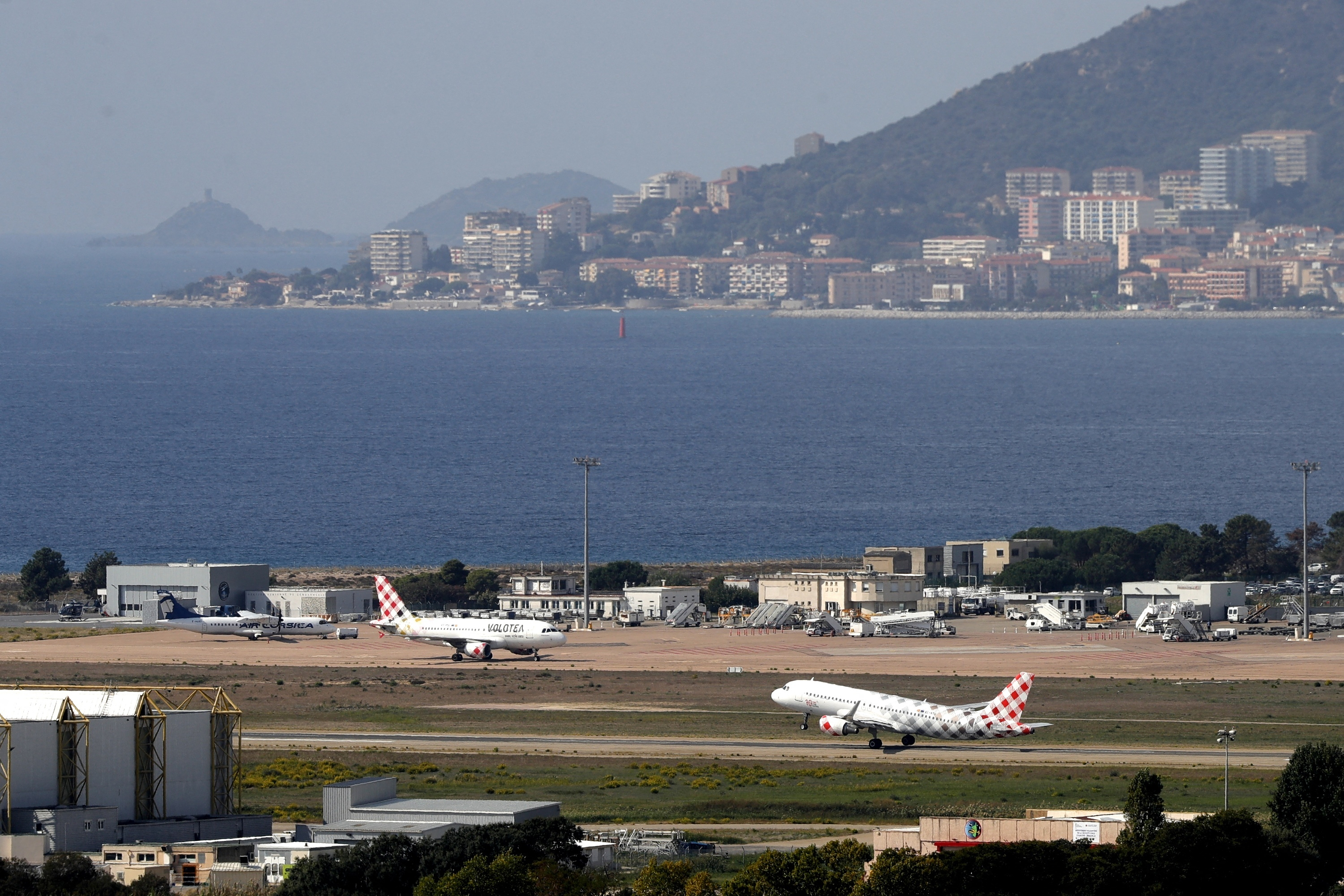The Federal Government's Rail Transport Commissioner experienced a serious disruption in the course of operations. But for Michael Theurer (FDP), State Secretary in the Federal Ministry of Transport, it was not about train cancellations in the past week. But about a communication debacle in terms of the Deutsche Bahn (DB) timetable. Theurer was not innocent of that.
He was quoted on ZDF as saying that the model for future rail transport - the Germany cycle with faster connections and quick transfer options - will be implemented "in the next 50 years as a project of the century". From this, ZDF calculated the year 2070 and concluded that the Germany cycle, which according to the traffic light coalition agreement should come in 2030, had been “postponed” by 40 years. This was particularly bad for the public because Transport Minister Volker Wissing (FDP) made forecasts for further growth in road traffic almost at the same time as Theurer's statement.
Afterwards, the ministry tried to correct it. The conclusion to a postponement was "wrong," said a spokeswoman. Rather, it has been clear for a long time that the Deutschlandtakt cannot be completed by 2030, but must be "implemented in stages". This is correct in itself. Because the Deutschlandtakt is actually a gigantic construction project that will actually take a few more decades and cost more than 60 billion euros.
The ideal, based on the Swiss model, is that at every station, for example, you can quickly connect to all available connections around the hour. To put it simply: All trains arrive just before the hour and leave just after the hour.
First of all, there must be enough tracks available. Many train stations therefore have to be expanded, such as Hamburg Central Station, which is already overloaded.
Second, all travelers must be able to transfer quickly. In many places, this requires additional underpasses or overpasses for pedestrians.
Thirdly, if the trains arrive or depart in large numbers within a few minutes, they must not get in each other's way. As a result, many station aprons have to be expanded and fitted with bridges for non-intersecting track crossings.
Fourth, the trains must actually arrive at the stations on the hour, not at ten past when the others have already left. So many routes have to be expanded or rebuilt so that the trains run faster and fit into the hourly schedule.
And fifthly, the network as a whole must allow for more train journeys for a denser interval timetable.
All of this takes time. But the ministry has not yet presented a timetable that would indicate when which stage on the way to that goal should be reached. Although the timetable goals and the necessary construction measures have long been defined.
Theurer's 50-year statement met with a lack of understanding from Hans Leister, board member of the Pro-Rail Alliance and co-chairman of a Deutschlandtakt working group formed jointly with the ministry. "So far I have assumed that we will be largely finished with the Germany cycle in 2040," said Leister WELT.
Because by 2040, according to the plans of the Ministry of Transport, "one of the prerequisites for the Germany cycle, the digitization of rail traffic, should be completed," says Leister. This conversion of the previous signaling and control systems can enable closer train sequences and higher speeds.
"The fact that we don't have to wait until 2070," Leister continues, "also applies because another requirement for the Germany cycle is to be met by 2030, at least on particularly important routes, namely more points and more overtaking opportunities on those high-speed corridors that DB wants to renovate in the next few years.” In fact, this railway modernization project is based on the targets of the Deutschlandtakt.
Leister does not deny that more is needed: "Certainly we also need major infrastructure projects for the Germany cycle, which can take a decade or more, i.e. new lines, major renovations of train stations or tunnels in large cities, as well as new and efficient terminals for the Freight transport.” But the ministry must now also face up to this task: “These major infrastructure projects must now be tackled. This requires money, shorter approval processes and more capacity for planning and construction.”
Leister does not want to accept the fact that there is currently a lack of such capacity in many places as a reason for sluggish construction. “Engineering offices and construction companies will develop this additional capacity if they see rail as the main area of investment in German transport policy. But they will only do that when the Federal Minister of Transport no longer announces that more and even wider motorways will be built,” says Leister. "As long as Wissing makes such announcements, the construction industry will continue to focus on road construction and not increase its capacity for rail expansion."
Of course, rail expansion is also stagnating because new lines for high-speed or freight trains in many regions are met with bitter resistance from various citizens' groups. Theurer recently addressed this in the "Schwäbische Zeitung": "On Sundays, most people are in favor of goods being shifted to rail. But if they are affected themselves, there will be demonstrations against freight routes from Monday to Saturday.” What is now needed is “a consensus across society to strengthen rail”.
The FDP politician should have in mind that this resistance is often supported by regional Greens and Social Democrats, who are pro-rail in the federal government. But Theurer will also have to address his call for consensus to his own party friends.
Because in Lower Saxony, the FDP has not campaigned for a new Hamburg-Hanover line either. And in East Westphalia, where there is a dispute about a new ICE connection between Hanover and Bielefeld, the FDP member of the Bundestag, Frank Schäffler, is quick to object to the project. The route would lead through Schäffler's constituency.
"Kick-off Politics" is WELT's daily news podcast. The most important topic analyzed by WELT editors and the dates of the day. Subscribe to the podcast on Spotify, Apple Podcasts, Amazon Music, among others, or directly via RSS feed.

 His body naturally produces alcohol, he is acquitted after a drunk driving conviction
His body naturally produces alcohol, he is acquitted after a drunk driving conviction Who is David Pecker, the first key witness in Donald Trump's trial?
Who is David Pecker, the first key witness in Donald Trump's trial? What does the law on the expulsion of migrants to Rwanda adopted by the British Parliament contain?
What does the law on the expulsion of migrants to Rwanda adopted by the British Parliament contain? The shadow of Chinese espionage hangs over Westminster
The shadow of Chinese espionage hangs over Westminster What High Blood Pressure Does to Your Body (And Why It Should Be Treated)
What High Blood Pressure Does to Your Body (And Why It Should Be Treated) Vaccination in France has progressed in 2023, rejoices Public Health France
Vaccination in France has progressed in 2023, rejoices Public Health France Food additives suspected of promoting cardiovascular diseases
Food additives suspected of promoting cardiovascular diseases “Even morphine doesn’t work”: Léane, 17, victim of the adverse effects of an antibiotic
“Even morphine doesn’t work”: Léane, 17, victim of the adverse effects of an antibiotic Collection of booklet A stalls in March
Collection of booklet A stalls in March Kering expects a 40 to 45% drop in operating profit in the first half
Kering expects a 40 to 45% drop in operating profit in the first half Smartphones, televisions, household appliances… MEPs adopt a “right to repair”
Smartphones, televisions, household appliances… MEPs adopt a “right to repair” Fintechs increasingly focused on business services
Fintechs increasingly focused on business services The standoff between the organizers of Vieilles Charrues and the elected officials of Carhaix threatens the festival
The standoff between the organizers of Vieilles Charrues and the elected officials of Carhaix threatens the festival Strasbourg inaugurates a year of celebrations and debates as World Book Capital
Strasbourg inaugurates a year of celebrations and debates as World Book Capital Kendji Girac is “out of the woods” after his gunshot wound to the chest
Kendji Girac is “out of the woods” after his gunshot wound to the chest The Court of Auditors scrutinizes the management and projects of the Center Pompidou
The Court of Auditors scrutinizes the management and projects of the Center Pompidou Skoda Kodiaq 2024: a 'beast' plug-in hybrid SUV
Skoda Kodiaq 2024: a 'beast' plug-in hybrid SUV Tesla launches a new Model Y with 600 km of autonomy at a "more accessible price"
Tesla launches a new Model Y with 600 km of autonomy at a "more accessible price" The 10 best-selling cars in March 2024 in Spain: sales fall due to Easter
The 10 best-selling cars in March 2024 in Spain: sales fall due to Easter A private jet company buys more than 100 flying cars
A private jet company buys more than 100 flying cars This is how housing prices have changed in Spain in the last decade
This is how housing prices have changed in Spain in the last decade The home mortgage firm drops 10% in January and interest soars to 3.46%
The home mortgage firm drops 10% in January and interest soars to 3.46% The jewel of the Rocío de Nagüeles urbanization: a dream villa in Marbella
The jewel of the Rocío de Nagüeles urbanization: a dream villa in Marbella Rental prices grow by 7.3% in February: where does it go up and where does it go down?
Rental prices grow by 7.3% in February: where does it go up and where does it go down? Europeans: “All those who claim that we don’t need Europe are liars”, criticizes Bayrou
Europeans: “All those who claim that we don’t need Europe are liars”, criticizes Bayrou With the promise of a “real burst of authority”, Gabriel Attal provokes the ire of the opposition
With the promise of a “real burst of authority”, Gabriel Attal provokes the ire of the opposition Europeans: the schedule of debates to follow between now and June 9
Europeans: the schedule of debates to follow between now and June 9 Europeans: “In France, there is a left and there is a right,” assures Bellamy
Europeans: “In France, there is a left and there is a right,” assures Bellamy These French cities that will boycott the World Cup in Qatar
These French cities that will boycott the World Cup in Qatar Football: VAFC supporters are ironic after their descent into National
Football: VAFC supporters are ironic after their descent into National Tennis: Carlos Alcaraz should play in Madrid
Tennis: Carlos Alcaraz should play in Madrid Football: victim of discomfort in the middle of a match in mid-April, Evan Ndicka will resume training with AS Roma
Football: victim of discomfort in the middle of a match in mid-April, Evan Ndicka will resume training with AS Roma Ligue 1: PSG almost champion, OM, shock for the C1… 5 reasons to follow an exciting evening
Ligue 1: PSG almost champion, OM, shock for the C1… 5 reasons to follow an exciting evening


















